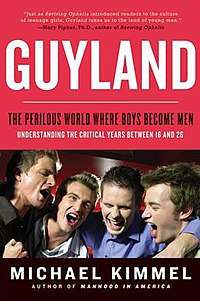Guyland
 | |
| Author | Michael Kimmel |
|---|---|
| Subject | Sociology |
| Genre | Non-fiction |
| Publisher | Harper |
Publication date | 2008 |
| Media type | Print (hardcover and paperback) |
| Pages | 356 |
| ISBN | 978-0-06-083134-9 |
| Preceded by | The Gender of Desire: Essays on Masculinity |
| Followed by | Privilege: a reader |
Guyland: The Perilous World Where Boys Become Men ( ISBN 978-0-06-083134-9) is a book by Michael Kimmel, published in 2008. The book covers the culture for young men transitioning from adolescence to adulthood.[1]
Kimmel interviewed 400 men aged 16 to 26 and identified a trend whereby young men increasingly delay adulthood.[2][3] Kimmel notes that, in 1960, almost 70% of American men had by the age of 30 left home, completed their educations, found a partner and started work. By comparison, today less than a third of men reach these milestones before their thirties. Kimmel writes that young men are reluctant to grow up because they "see grown-up life as such a loss".[4] In order to avoid the responsibilities of adulthood, young men retreat into a homosocial world Kimmel terms "Guyland", a social space and a stage of life where "guys gather to be guys with each other, unhassled by the demands of parents, girlfriends, jobs, kids, and the other nuisances of adult life".[1] Young white men, in particular, feel a sense of "thwarted entitlement", believing that women and minorities have taken away traditionally white male jobs and positions.[5][2]
References
- 1 2 "Boys to men: Why guys aren't growing up". MSNBC. August 27, 2008. Archived from the original on 2009-11-02. Retrieved May 14, 2012.
- 1 2 Jacobs, Mindelle (October 5, 2011). "Boys will be boys". Edmonton Sun. Retrieved May 14, 2012.
- ↑ Brubach, Holly (September 4, 2008). "Dudes in Guyland". The New York Times. Retrieved May 14, 2012.
- ↑ Dokoupil, Tony (August 28, 2008). "Why I Am Leaving Guyland". Newsweek. Retrieved May 14, 2012.
- ↑ Hannaham, James (September 17, 2008). "Dude, where's my manhood?". Salon (website). Retrieved May 14, 2012.
External links